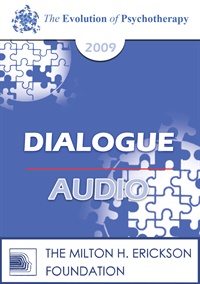
- Average Rating:
- Not yet rated
- Topic Areas:
- Dialogues | Humor | Psychotherapy | Therapist Development
- Categories:
- Evolution of Psychotherapy | Evolution of Psychotherapy 2009
- Faculty:
- Cloe Madanes, HDL, LIC | Jeffrey Zeig, PhD
- Duration:
- 55 Minutes
- Format:
- Audio Only
- Original Program Date:
- Dec 12, 2009
- Short Description:
- EP09 Dialogue 16 – Humor in Therapy – Cloe Madanes, Lic. Psic and Jeffrey Zeig, PhD Educational Objective: Given a topic, to describe the differing approaches to psychotherapy, and to identify the strengths and weaknesses of each approach.
- Price:
- $15.00 - Base Price
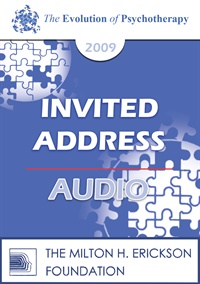
- Average Rating:
- Not yet rated
- Topic Areas:
- Invited Addresses | Buddhism | Meditation, Spirituality and Yoga | Trauma | Psychotherapy
- Categories:
- Evolution of Psychotherapy | Evolution of Psychotherapy 2009
- Faculty:
- Mary Pipher, PhD
- Duration:
- 44 Minutes
- Format:
- Audio Only
- Original Program Date:
- Dec 11, 2009
- Short Description:
- In describing her newly published memoir, Dr. Pipher explores her personal search for understanding, tranquility, and respect through her work as a psychologist and seeker.
- Price:
- $15.00 - Base Price
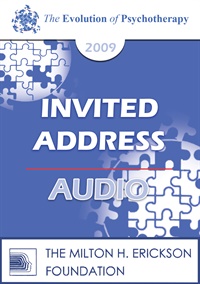
- Average Rating:
- Not yet rated
- Topic Areas:
- Invited Addresses | Eating Disorders | Research | Psychotherapy | Weight Loss
- Categories:
- Evolution of Psychotherapy | Evolution of Psychotherapy 2009
- Faculty:
- Judith Beck, PhD
- Duration:
- 58 Minutes
- Format:
- Audio Only
- Original Program Date:
- Dec 11, 2009
- Short Description:
- Millions of Americans are overweight or obese. Medication and psychotherapy may result in modest weight loss but nearly all regain weight within five years. The missing ingredient for successful treatment is cognition. To make permanent changes in their eating behavior, and thus their weight, individuals must learn how to change their dysfunctional ideas about food,eating, other people, themselves, and learn how to cope with a sense of unfairness, deprivation, disappointment and dis-couragement. Cognitive behavioral approaches have been demonstrated to be effective for this problem.
- Price:
- $15.00 - Base Price
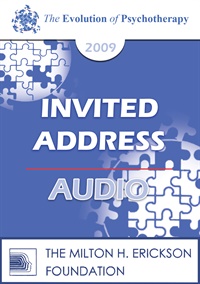
- Average Rating:
- Not yet rated
- Topic Areas:
- Invited Addresses | Mindfulness | Dialectic Behavior Therapy (DBT) | Psychotherapy
- Categories:
- Evolution of Psychotherapy | Evolution of Psychotherapy 2009
- Faculty:
- Marsha Linehan, PhD
- Duration:
- 52 Minutes
- Format:
- Audio Only
- Original Program Date:
- Dec 11, 2009
- Short Description:
- With her Dialectical Behavioral Therapy, Marsha Linehan was one of the first practitioners to show how East and West could meet in the consulting room. She will address how critical it is that psychotherapists strive for both a well-being of our clients and the scientific validation of our methods.
- Price:
- $15.00 - Base Price
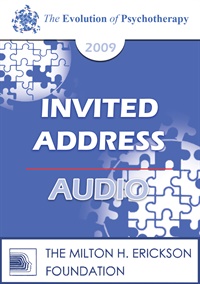
- Average Rating:
- Not yet rated
- Topic Areas:
- Invited Addresses | Psychotherapy | Therapist Development
- Categories:
- Evolution of Psychotherapy | Evolution of Psychotherapy 2009
- Faculty:
- David Burns, MD
- Duration:
- 1 Hour 1 Minutes
- Format:
- Audio Only
- Original Program Date:
- Dec 11, 2009
- Short Description:
- Dr. Burns will describe disturbing new research on the accuracy, or lack of accuracy of clinician’s perceptions of how patients feel, and how they feel about us. He will illustrate new, brief and highly accurate assessment instruments that can dramatically boost your clinical understanding and effectiveness.
- Price:
- $15.00 - Base Price
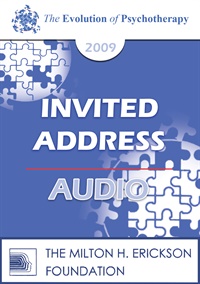
- Average Rating:
- Not yet rated
- Topic Areas:
- Invited Addresses | Psychotherapy
- Categories:
- Evolution of Psychotherapy | Evolution of Psychotherapy 2009
- Faculty:
- Albert Bandura
- Duration:
- 1 Hour 4 Minutes
- Format:
- Audio Only
- Original Program Date:
- Dec 12, 2009
- Short Description:
- This address will present belief in one’s causative power as the foundation of human motivation, aspiration, accomplishments, and well-being. Whatever other factors serve as guides and motivators, they are rooted in the core belief that one has the power to make changes in one’s functioning and life conditions.
- Price:
- $15.00 - Base Price
Tags: Psychotherapy
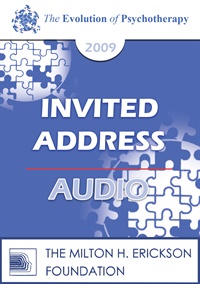
- Average Rating:
- Not yet rated
- Topic Areas:
- Psychology | Invited Addresses | Positive Psychology | Psychotherapy
- Categories:
- Evolution of Psychotherapy | Evolution of Psychotherapy 2009
- Faculty:
- Martin Seligman, PhD
- Duration:
- 58 Minutes
- Format:
- Audio Only
- Original Program Date:
- Dec 12, 2009
- Short Description:
- EP09 Invited Address 07 – Advances in Positive Psychology – Martin Seligman, PhD This address will present belief in one’s causative power as the foundation of human motivation, aspiration, accomplishments, and well-being. Whatever other factors serve as guides and motivators, they are rooted in the core belief that one has the power to make changes in one’s functioning and life conditions.
- Price:
- $15.00 - Base Price
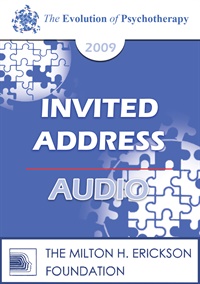
- Average Rating:
- Not yet rated
- Topic Areas:
- Invited Addresses | Children and Adolescent Therapy | Psychotherapy | Trauma
- Categories:
- Evolution of Psychotherapy | Evolution of Psychotherapy 2009
- Faculty:
- Violet Oaklander, PhD
- Duration:
- 59 Minutes
- Format:
- Audio Only
- Original Program Date:
- Dec 12, 2009
- Short Description:
- All children are born with the capacity to develop and use all of the aspects of the organism to live healthy, productive, joyful lives. We know that trauma interrupts the healthy development of the child. There are also some very basic developmental aspects that can further thwart healthy development. An understanding of these hindrances is the first step toward helping children heal.
- Price:
- $15.00 - Base Price
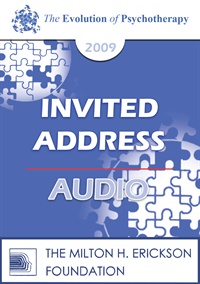
- Average Rating:
- Not yet rated
- Topic Areas:
- Psychotherapy | Invited Addresses | Mindfulness | Neuroscience
- Categories:
- Evolution of Psychotherapy | Evolution of Psychotherapy 2009
- Faculty:
- Daniel Siegel, MD
- Duration:
- 56 Minutes
- Format:
- Audio Only
- Original Program Date:
- Dec 12, 2009
- Short Description:
- Psychotherapy is at a turning point in the new millennium. We can now draw on the principles of a vast array of sciences, including that of neuroplasticity, to create new approaches to therapeutic interventions that are aimed in specific ways to alter the connections in the brain. Mindsight is the capacity to monitor and modify the internal world. As we help others, and ourselves, to focus attention in specific ways that promote neural integration – to stimulate the linkage of different regions to one another – we can create the fundamental changes in brain structure that underlie therapeutic improvement.Effective psychotherapy can use mindsight to focus attention in ways that promote neural integration and cultivate well-being in body, mind, and relationships.
- Price:
- $15.00 - Base Price
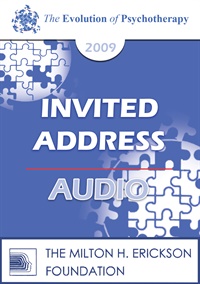
- Average Rating:
- Not yet rated
- Topic Areas:
- Invited Addresses | Marriage | Couples Therapy | Family Therapy | Psychotherapy
- Categories:
- Evolution of Psychotherapy | Evolution of Psychotherapy 2009
- Faculty:
- John Gottman, PhD | Julie Gottman, PhD
- Duration:
- 43 Minutes
- Format:
- Audio Only
- Original Program Date:
- Dec 13, 2009
- Short Description:
- Longitudinal research with newlyweds shows that 67% have a drop in marital satisfaction in the first three years of their baby’s life. Hostility between the partners increases, and the baby’s emotional, cognitive, and neurological development are all adversely affected. The Bringing Baby Home program, which will be described, is effective in preventing both these negative changes and post-partum depression.
- Price:
- $15.00 - Base Price
Please wait ...

